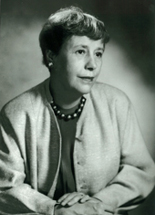SSA Centennial Celebration
Profiles of Distinction Series
Charlotte Towle
Professor Charlotte Towle believed that an understanding of the relationship between the dynamic inner life of man and his social environment was vital for all students of social work. Her conviction and leadership in integrating the application of psychology throughout the casework curriculum revolutionized the discipline.
Raised in Butte, Montana, Miss Towle was educated back East, receiving a B.A. in education from Goucher College in 1919. After graduation, a position with the American Red Cross bolstered her growing interest in social work. Supported by a Commonwealth Fund fellowship, she completed her studies in psychiatric social work at the New York School of Social Work (now a part of Columbia University) in 1926.
For the next two years, Miss Towle worked as director of the Home Finding Department of The Children's Aid Society of Philadelphia. From 1928 to 1932, she served as fieldwork supervisor for students from the New York and Smith College schools of social work at the Institute for Child Guidance in New York. Established by the Commonwealth Fund as a model clinic, the Institute was at the forefront of psychiatric social work theory and practice.
In 1932, in an effort to intensify its psychiatric emphasis, Edith Abbott invited Miss Towle to join the faculty at the School of Social Service Administration. Given SSA’s origins in the settlement movement, its curriculum was oriented toward social welfare and policy administration. Initially, Dean Abbott had resisted the growing trend toward emphasizing a psychiatric model in casework. However, when the Commonwealth Fund began offering student stipends to SSA contingent upon its introducing psychiatric casework courses into the curriculum and developing psychiatric field placements, she turned to Miss Towle.
In 1941, Miss Towle edited a collection of Social Case Records from Psychiatric Clinics with Discussion Notes as a volume in the Social Service Series published by SSA. Through widespread classroom use of the book and through her work on the curriculum committees of the American Association of Schools of Social Work and the American Association of Psychiatric Social Workers, she helped define a generic casework curriculum for most schools.
Just as her psychiatric orientation affected the SSA curriculum, Miss Towle herself was influenced by the broad social concerns and activities of her SSA colleagues. For example, she became interested in the philosophy of social work. In her 1945 book, Common Human Needs, she illuminated the connection between understanding human behavior and administering social welfare programs. She asserted that psychological needs and forces were tied to social forces and experience.
Ironically, it was a 1951 political incident, “The Common Human Needs Affair,” that garnered the most publicity for Miss Towle's book. A statement of hers was misconstrued as leftist propaganda by the president of the American Medical Association. Accused of promoting socialist attitudes, Oscar Ewing, administrator of the Federal Security Agency, the book’s publisher, ordered the Government Printing Office to destroy its remaining copies. The social work profession and civil libertarians came to Miss Towle’s defense, but Ewing held firm. Consequently, the book was republished by the National Association of Social Workers. The second publishing received even wider circulation than the first.
A third interest of Miss Towle’s was synthesizing theories of education and personality to develop a more comprehensive approach to professional education in social work as well as in other professions. Her courses in “Growth and Development of Personality” and “Dynamics of Learning and Teaching” reflected this interest, as did many of her papers and articles. She compiled her theories in a 1954 book, The Learner in Education for the Professions. Miss Towle's leadership in generic casework theory and in casework education earned her an invitation to spend 1954-55 as a senior Fulbright scholar at the London School of Economics. When her passport was temporarily withheld on suspicion of "communist" leanings, she again became a cause célèbre in her profession and beyond. Her reputation cleared, she finally obtained a passport and spent a productive year abroad.
During the later years of her career, Miss Towle's contributions as a social work theorist and practitioner were acknowledged with numerous honorary doctorates and citations from professional organizations. She retired from the faculty in 1964, but continued part-time for two years as a fieldwork supervisor for SSA students. She had just retired from this position at the time of her death.
